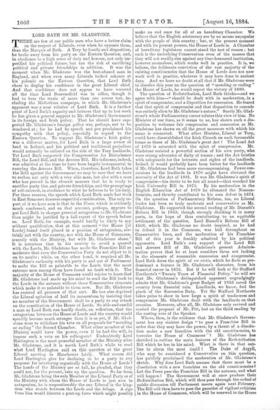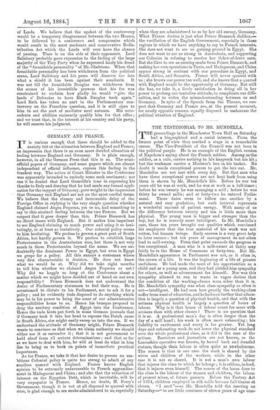LORD BATH ON MR. GLADSTONE.
THERE are few of our public men who have a better claim
on the respect of Liberals, even when he opposes them, than the Marquis of Bath. A Tory by family and disposition, he broke away from his party on the Eastern Question, and, in obedience to a high sense of duty and honour, not only im- perilled his political future, but ran the risk of sacrificing
political and private friendships in addition. It was the moment when Mr. Gladstone was the best-abused man in England, and when even many Liberals looked askance at his polemic on the Eastern Question, that Lord Bath chose to display his confidence in the great Liberal chief. And that confidence does not appear to have wavered all the time Lord Beaconsfield was in office, though it had to bear the strain of more than one severe test, in- cluding the Midlothian campaign, in which Mr. Gladstone's opponent was a near relative of Lord Bath. It is a further proof of Lord Bath's sagacity and fairness that up to last week he has given a general support to Mr. Gladstone's Government in its foreign and Irish policy. That he should have sup- ported Mr. Gladstone's foreign policy was, perhaps, not to be wondered at ; for he had by speech and pen proclaimed his sympathy with that policy, especially in regard to the Eastern Question. To support Mr. Gladstone's Irish policy was a different matter, for Lord Bath is a large owner of land in Ireland, and his political and traditional prejudices would naturally be enlisted on the side of the Tory landlords. Yet Lord Bath supported the Compensation for Disturbance Bill, the Land Bill, and the Arrears Bill. His influence, indeed, was admitted at the time to have been largely instrumental in carrying the Arrears Bill. When, therefore, Lord Bath takes the field against the Government we may be sure that we have to reckon not only with a very able man, but also with a man who has proved in the clearest manner that he is ready to sacrifice party ties, and private friendships, and the promptings of self-interest, in obedience to what he believes to be his duty. For these reasons, the speech which Lord Bath made last week in East Somerset deserves respectful consideration. The only re- port of it we have seen is that in the Times, which is evidently ranch condensed, and on that account, perhaps, appears to put Lord Bath in sharper personal antagonism to Mr. Gladstone than might be justified by a full report of the speech before us. Lord Bath, for example, would hardly be likely to say without qualification, that at this moment " the House [of Lords] found itself placed in a position of antagonism, cer- tainly not with the country, nor with the House of Commons, scarcely with the Ministry, but with Mr. Gladstone alone." It is notorious that in his anxiety to avoid a quarrel with the Lords, Mr. Gladstone has made the Franchise Bill so moderate that even the Conservative Party do not object to it on its merits ; while, on the other hand, it required all Mr.
• Gladstone's authority with his party in and out of Parliament to make the Bill so palatable to the Lords that the most extreme men among them have found no fault with it. The majority of the House of Commons would rejoice to learn that Mr. Gladstone had made up his mind to send the Bill back to the Lords in the autumn without those Conservative elements which make it so palatable to them now. But Mr. Gladstone has resisted all pressure of that sort. He has also deprived the Liberal agitation of half its momentum by insisting that no member of the Government shall be a party to any attack on the constitution of the House of Lords. So able and candid a man as Lord Bath can hardly doubt, on reflection, that the antagonism between the House of Lords and the country would speedily become much stronger than it is as yet, if Mr. Glad- stone were to withdraw his veto on all proposals for "mending or ending" the Second Chamber. What other member of the Ministry would have the power, even if he had the will, to impose such a veto on his colleagues ? Undoubtedly Lord Hartington is the most powerful member of the Ministry after Mr. Gladstone, and it is worth Lord Bath's while to read what Lord Hartington said on this question at the great Liberal meeting in Manchester lately. What reason did Lord Hartington give for declining to be a party to any proposal for interfering organically with the House of Lords ? The hands of the Ministry are so full, he pleaded, that they could not, for the present, take up the question. So far from Mr. Gladstone being the only Member of the Liberal Party or of the Ministry with whom the House of Lords is just now in antagonism, he is unquestionably the one Liberal in the king- dom who stands between the Lords and the deluge. A sign from him would liberate a pent-up force which might possibly
make an end once for all of an hereditary Chamber. We believe that the English aristocracy are by no means unpopular with the people of this country ; but, at the present moment and with its present powers, the House of Lords is. A Chamber of hereditary legislators cannot stand the test of reason ; but such is the underlying Conservatism even of the masses that they will not readily rise against any time-honoured institution, however anomalous, which works well in practice. It is, we believe, the deliberate conviction of the vast majority of the existing constituencies that the House of Lords does not now work well in practice, whatever it may have done in ancient days. And we have no doubt at all that if Mr. Gladstone were to dissolve this year on the question of " mending or ending " the House of Lords, he would repeat the victory of 1880. The question of Redistribution, Lord Bath thinks—and we agree with him—" should be dealt with in moderation, in a spirit of compromise, and a disposition for concession. He feared that that spirit of compromise and that disposition to concede was entirely alien to Mr. Gladstone's nature." Surely Mr. Glad- stone's whole Parliamentary career refutes this view of him. No Minister of our time, as it seems to us, has shown such a dis- position to welcome fair compromise and concession as Mr. Gladstone has shown on all the great measures with which his name is connected. What other Minister, Liberal or Tory, could have disestablished the Irish Church on such favourable terms as those of Mr. Gladstone's great Act ? The Land Act of 1870 is saturated with the spirit of compromise. Mr. Gladstone resisted a powerful section of his own party, who were strong advocates of fixity of tenure; the Act bristles with safeguards for the interests and rigts of the landlords. Indeed, it would probably have been better for the landlords if Mr. Gladstone had been more uncompromising. Fewer con- cessions to the landlords in 1870 might have obviated the necessity of the Act of 1881. It was Mr. Gladstone's spirit of compromise—his desire to be fair all round—that wrecked his Irish University Bill in 1873. By his moderation in the English Education Act of 1870 he alienated the Noncon- formists, and thereby contributed to his own defeat in 1874. On the question of Parliamentary Reform, too, no Liberal leader has been so truly moderate and conservative as Mr. Gladstone. He supported the second reading of Mr. Disraeli's Reform Bill in 1859, though strongly disliking it in many parts, in the hope of thus contributing to an equitable settlement of the question. Lord Russell's Reform Bill of 1866, which Mr. Gladstone no doubt inspired, as he had to defend it in the Commons, was laid throughout on Conservative lines, and the moderation of his Franchise Bill of this year is frankly admitted by his political opponents. Lord Bath's own support of the Land Bill and Arrears Bill of Mr. Gladstone's present Adminis- tration proves that he at least considers them not lacking in the elements of reasonable concession and compromise. Lord Bath dates the spirit of vice victis, which he finds so pre- dominant a feature in Mr. Gladstone's character, from his financial career in 1853. But if he will look at Sir Stafford Northcote's " Twenty Years of Financial Policy," he will see that Mr. Gladstone's distinguished opponent ungrudgingly admits that Mr. Gladstone's great Budget of 1853 saved the country from financial ruin. Landlords, we know, feel the pinch of the Succession Duty. Yet Sir Stafford Northcote takes pains to show in how large a spirit of tenderness and compromise Mr. Gladstone dealt with the landlords on that occasion. Moreover, after all, Mr. Gladstone only revived and carried the proposal of Mr. Pitt, lost on the third reading by the casting vote of the Speaker.
Where, then, is the evidence that Mr. Gladstone's Govern- ment has any sinister design " to pass a Franchise Bill in order that they may have the power, by a threat of a dissolu- tion under a new franchise with the old constituencies, to terrorise the House of Commons " ? Mr. Gladstone has sketched in outline the main features of the Redistribution Bill which he has in his mind. What is there in that onto- line to alarm the most timid ? The Duke of Argyll, who may be considered a Conservative on this question, has publicly proclaimed the moderation of Mr. Gladstone's sketch. Why does Lord Bath assume that there must be a dissolution with a new franchise on the old constituencies? Let the Peers pass the Franchise Bill in the autumn, and what will happen ? The Government will at once produce their Redistribution Bill, which will thus pass through the ordeal of public discussion till Parliament meets again next February. The Bill will then have to pass the gauntlet of vigilant criticism in the House of Commons, which will be renewed in the House
of Lords. We believe that the upshot of the controversy would be a temporary disagreement between the two Houses, to be followed by a conference and compromise which would result in the most moderate and conservative Redis- tribution Act which the Lords will ever have the chance of passing. Time is on the side of their opponents. Lord Salisbury probably gave expression to the feeling of the large majority of the Tory Party when he expressed lately his dread of the " formidable personality " of Mr. Gladstone. When that formidable personality has been withdrawn from the political arena, Lord Salisbury and his peers will discover too late what a shield it has been against their assailants. It was not till the formidable Douglas was withdrawn from the scenes of his irresistible prowess that his foe was constrained to exclaim how gladly he would " give the lands o' Deloraine to have Black Douglas back again." Lord Bath has taken no part in the Parliamentary con- troversy on the Franchise question, and it is still open to him to act the part of mediator next autumn. His ante- cedents and abilities eminently qualify him for that office ; and we trust that, in the interest of his country and his party, he will reserve his judgment.



































 Previous page
Previous page